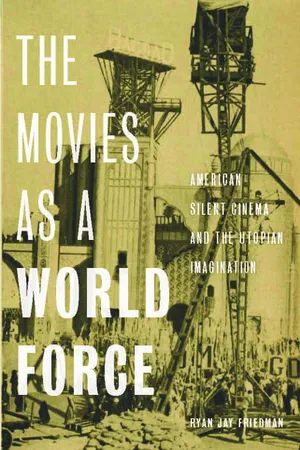
The Movies as a World Force
American Silent Cinema and the Utopian Imagination
- English
- ePUB (mobile friendly)
- Available on iOS & Android
About this book
Throughout the silent-feature era, American artists and intellectuals routinely described cinema as a force of global communion, a universal language promoting mutual understanding and harmonious coexistence amongst disparate groups of people. In the early 1920s, film-industry leaders began to espouse this utopian view, in order to claim for motion pictures an essentially uplifting social function. The Movies as a World Force examines the body of writing in which this understanding of cinema emerged and explores how it shaped particular silent films and their marketing campaigns. The utopian and universalist view of cinema, the book shows, represents a synthesis of New Age spirituality and the new liberalism. It provided a framework for the first official, written histories of American cinema and persisted as an advertising trope, even after the transition to sound made movies reliant on specific national languages.
Frequently asked questions
- Essential is ideal for learners and professionals who enjoy exploring a wide range of subjects. Access the Essential Library with 800,000+ trusted titles and best-sellers across business, personal growth, and the humanities. Includes unlimited reading time and Standard Read Aloud voice.
- Complete: Perfect for advanced learners and researchers needing full, unrestricted access. Unlock 1.4M+ books across hundreds of subjects, including academic and specialized titles. The Complete Plan also includes advanced features like Premium Read Aloud and Research Assistant.
Please note we cannot support devices running on iOS 13 and Android 7 or earlier. Learn more about using the app.
Information
Table of contents
- Cover
- Title Page
- Copyright Page
- Contents
- Introduction: Motion Pictures and Modern Communion
- Chapter 1. Enlightened Public Opinion: Postreform Progressivism, Mental Science, and Gerald Stanley Lee’s “Moving-Pictures”
- Chapter 2. “The Occult Elements of Motion and Light”: Vachel Lindsay’s Utopia of the Mirror Screen
- Chapter 3. “The Motion Picture Is War’s Greatest Antidote”: Rescue as Release of Force in D. W. Griffith’s Intolerance
- Chapter 4. “Everything Wooed Everything”: The Triumph of Morale over Moralism in Rupert Hughes’s Souls for Sale
- Chapter 5. “Little Grains of Sand”: Positive Thinking and Corporate Form in Douglas Fairbanks’s The Thief of Bagdad
- Conclusion: Universal History and the Historicity of Film Entertainment
- Acknowledgments
- Notes
- Index
- About the Author